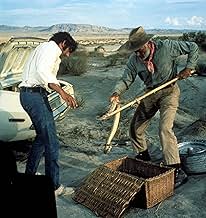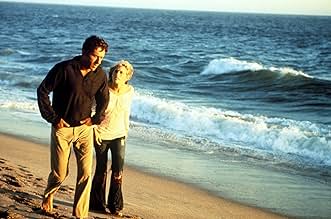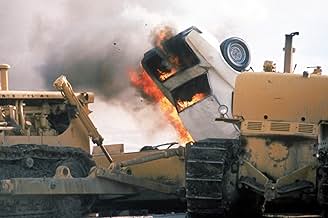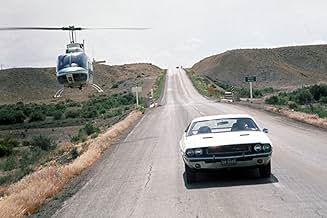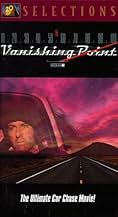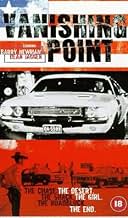Um ex-fuzileiro, ex-corredor automobilístico e ex-policial demitido da corporação, dedica-se a transportar carros para uma pequena oficina. Em um desses trabalhos ele deve levar um Dodge Cha... Ler tudoUm ex-fuzileiro, ex-corredor automobilístico e ex-policial demitido da corporação, dedica-se a transportar carros para uma pequena oficina. Em um desses trabalhos ele deve levar um Dodge Challenger '70 de Denver para São Francisco.Um ex-fuzileiro, ex-corredor automobilístico e ex-policial demitido da corporação, dedica-se a transportar carros para uma pequena oficina. Em um desses trabalhos ele deve levar um Dodge Challenger '70 de Denver para São Francisco.
- Direção
- Roteiristas
- Artistas
- Prêmios
- 1 indicação no total
- Hitch-Hiker
- (cenas deletadas)
- Deputy Collins
- (as Bob Donner)
- Direção
- Roteiristas
- Elenco e equipe completos
- Produção, bilheteria e muito mais no IMDbPro
Avaliações em destaque
Why? Is it because of his past; ex-cop, ex-racer, tragically bereaved? Is it because of the truckload of speed he takes at the beginning of the movie (draw your own metaphors between Kowalski's internal use of the noun and external use of the verb)?
Or is it the road, the infinite expanses of the Southwest, the silence, the freedom, the sound of the motor surging, the tires spinning, the wheels gobbling up and sitting out the black asphalt? Who knows? Kowalski seems indifferent as to why he drives, only that he must drive, must evade, must get to where he is going and will not - can not - be stopped.
Do yourself a favor. Rent the original, don't see the '97 made for TV movie (it has some high points, but it's like watching the '99 "Psycho" before seeing the Alfred Hitchcock original). In fact, rent this and "Two Lane Blacktop" from Monte Hellman, and "Mad Max" and/or "The Road Warrior". Watch all of them in as close to one sitting as you can get.
If after watching these movies, you don't understand how they're expressions of the same call to the open road, return them and give up. Not everyone was meant to hear it, just like not everyone has perfect pitch or the ability to wiggle their ears.
This movie drove me (pun intended) to take the handle kowalski and buy a Challenger of my own (flame red, 1973, you see the 1970 R/Ts are very hard to get).
It probably won't do the same for you, but if you've ever been driving down the open road and wondered what would happen if you _didn't_ get off at the next exchange, in fact if you never got off at all, then this film is for you.
And I hope the next ignoramus who compares this masterful film to "The Dukes of Hazzard" loses his brakes and plows into a line of parked Harleys outside some bar with a name like Whiskey Junction or the Dew Drop Inn.
While the film sounds at first to be a simple action film, it's really much more than that. Kowalksi's past is revealed little by little through flashbacks, making the film something of a character study. Kowalski's trip becomes a road trip of existentialism as he runs across various strange characters: Solitary hippies, gay bandits, a boogie-woogie snake handling Christian cult, and the blind soul station DJ (brilliantly played by Cleavon Little) who is attempting to guide him on his journey from within the car's radio.
Topping it off is a great soundtrack, breathtaking cinematography and direction, and automotive action that has seen no equal. This film manages to be both compelling and exciting. Just watch it already.
10/10
Seeing it again is a real lesson on how certain cinematic language, if presented purely, transcends. And for a US-made movie, it is pretty pure.
If you do not know it, the primary narrative is essentially no narrative: a muscle car speeding across the desert chased by police, initially for speeding and ultimately just to exert power. This fellow is Kowalski, a name imported from a landmark film. He simply drives. It is his life now. We see flashbacks. Find he was a Medal of Honor winner in Vietnam, a star racer and then a cop. There's a backstory about his being a good cop and turning in some rotten apples, so by degrees we come to understand the moral landscape.
There is only one other character, a blind black disk jockey who is listened to by apparently everyone. Guided by his eavesdropping on police radio, and some psychic ability.
This was after "Easy Rider" and instead of bold men moving into a life, we have life chasing an honest man. Same ethic, could even have been the same man. But he knows himself. He knows he is a cinematic creature, someone to be observed and dreamed about. He knows he carries his world with him. Always borrowed.
You can see Malick here, the notion that the character sees us seeing him, that he knows he is fictional and knows we think him not. You can trace it to the female version in "Thelma and Louise," where they have their end only because they know someone will watch. Its not like "Cool Hand Luke," or "Bonnie and Clyde" at all where the man decides. That comes from the Hollywood western.
Its derived from the "Breathless" tradition.
A good third of this film is spent on the "audience," the rural townspeople. These parts are filmed in a documentary style, with — it seems — real people who have come to watch the filming, having heard on the radio from a borrowed soul. They look dumb and bored, clearly with nothing better to do than watch, just like us.
Ted's Evaluation -- 3 of 3: Worth watching.
Disc jockey Super Soul (Cleavon Little) and delivery driver Kowalski (Barry Newman) are two of these specters, marginal but decent, intelligent men who can't or won't live in burgeoning competing cultures which in reality have offered them very little of worth or substance, despite their own personal sacrifices. Kowalski himself had tried to "fit in" with the Establishment as a soldier and police officer and later, attempted to do the same with the blossoming 1960s counterculture, but soon disappointingly found that they both were ridden with their own various forms of dishonesty and insincerity. Personal honor, self-reliance and genuine respect--Kowalski's stock in trade--were tragically valued very little by either, despite each one's shrill and haughty claims to the contrary.
Moreover, it's no accident Newman's character has a Polish surname; the Poles throughout their history have created a very rich and unique Slavic culture largely based upon just such a "marginality"--being geographically jammed between powerful historic enemies, Germany and Russia, and never being able to fully identify with either one, at often great cost to themselves. It's also no accident Little's character is blind and black, the only one of his kind in a small, all-Caucasian western desert town--his sightlessness enhancing his persuasiveness and his ability to read Kowalski's mind, the radio microphone his voice, his race being the focus of long simmering and later suddenly explosive disdain--all of the characteristics of a far-seeing prophet unjustly (but typically) dishonored in his own land.
The desert environment also plays a key role in cementing the personal relationship between and respective fates of these two men--to paraphrase British novelist J.G. Ballard, prophets throughout our history have emerged from deserts of some sort since deserts have, in a sense, exhausted their own futures (like Kowalski himself had already done) and thus are free of the concepts of time and existence as we have conventionally known them (as Super Soul instinctively knew, thus creating his own psychic link to the doomed driver.) Everything is somehow possible, and yet, somehow nothing is.
Finally, VP is also a "fin de siecle" story, a unique requiem for a quickly dying age- a now all-but-disappeared one of truly open roads, endless speed for the joy of speed's sake, of big, solid no-nonsense muscle cars, of taking radical chances, of living on the edge in a colorful world of endless possibility, seasoned with a large number and wide variety of all sorts of unusual characters, all of which had long made the USA a wonderful place--and sadly is no longer, having been supplanted by today's swarms of sadistic, military-weaponed cop-thugs, obsessive and intrusive safety freaks, soulless toll plazas, smug yuppie SUV drivers, tedious carbon-copy latte towns, and a childish craving for perfect, high-fuel-efficiency safety and security.
The just-issued DVD contains both the US and UK releases of the film; the UK release, I believe, is a much more satisfying film, as it has the original scenes deleted from the US version. As an aside, Super Soul's radio station call letters, KOW, are in fact the ones for a country & western station in San Diego.
Você sabia?
- CuriosidadesIn an interview, actor Paul Koslo spoke about legendary stunt driver Cary Loftin; "One night coming home from location, Cary was driving one of the Challengers back to the hotel, and he passed some New Mexico state troopers going 145 miles an hour! [laughs] He had four or five cop cars behind him with their lights on, but they couldn't catch up because they could only go about 125! So he drove into this little town and started to shut the car down. He pulled into a gas station, and I swear to God, he did a 360 in between the pumps and put the rear of the car - the gas tank - right in front of the super pump! He got out of the car like nothing happened, and the troopers busted his ass right there! [laughs] Oh, you should've seen those cops! They were fuming! They took him in, and the producer had to explain to them that Cary had actually been testing the car - that he did a lot of these spinouts because he'd been having trouble with the car! [laughs] I mean, you do have to test the cars, but you don't do it while you're driving home!"
- Erros de gravaçãoThe 19-inch racks in Super Soul's radio station with large tape reels (in one scene seen fast moving) are not audio equipment. These tape drives were used in computer systems in the 1970s to store data on tape.
- Citações
Super Soul: This radio station was named Kowalski, in honour of the last American hero to whom speed means freedom of the soul. The question is not when's he gonna stop, but who is gonna stop him.
- Cenas durante ou pós-créditosThe Fox logo is shown without the fanfare making it one of the first times this has happened.
- Versões alternativasWhen first released in Brazil, the movie had some scenes cut, reducing the running time to 99 minutes.
- Trilhas sonorasYou Got to Believe
Composed by Delaney Bramlett
Sung by Delaney & Bonnie & Friends
(Courtesy of Atlantic Records)
Principais escolhas
Detalhes
- Data de lançamento
- País de origem
- Idioma
- Também conhecido como
- Carrera contra el destino
- Locações de filme
- Goldfield Hotel, Goldfield, Nevada, EUA(KOW radio station)
- Empresa de produção
- Consulte mais créditos da empresa na IMDbPro
Bilheteria
- Orçamento
- US$ 1.585.000 (estimativa)
- Faturamento bruto nos EUA e Canadá
- US$ 12.442.673
- Faturamento bruto mundial
- US$ 12.443.192
- Tempo de duração1 hora 39 minutos
- Cor
- Proporção
- 1.85 : 1
Contribua para esta página



